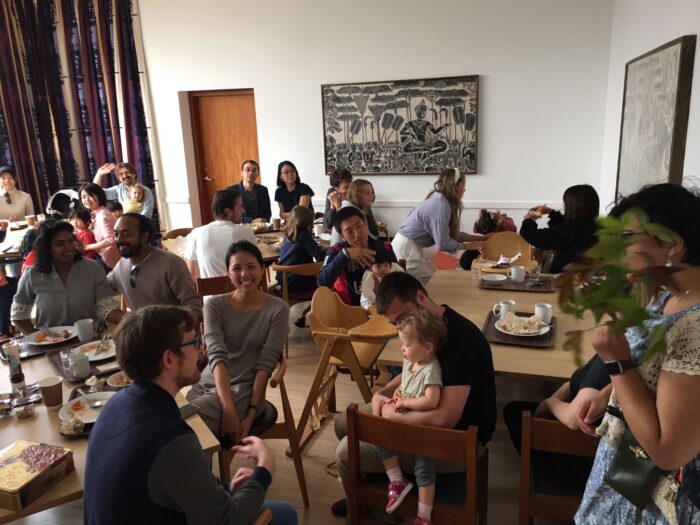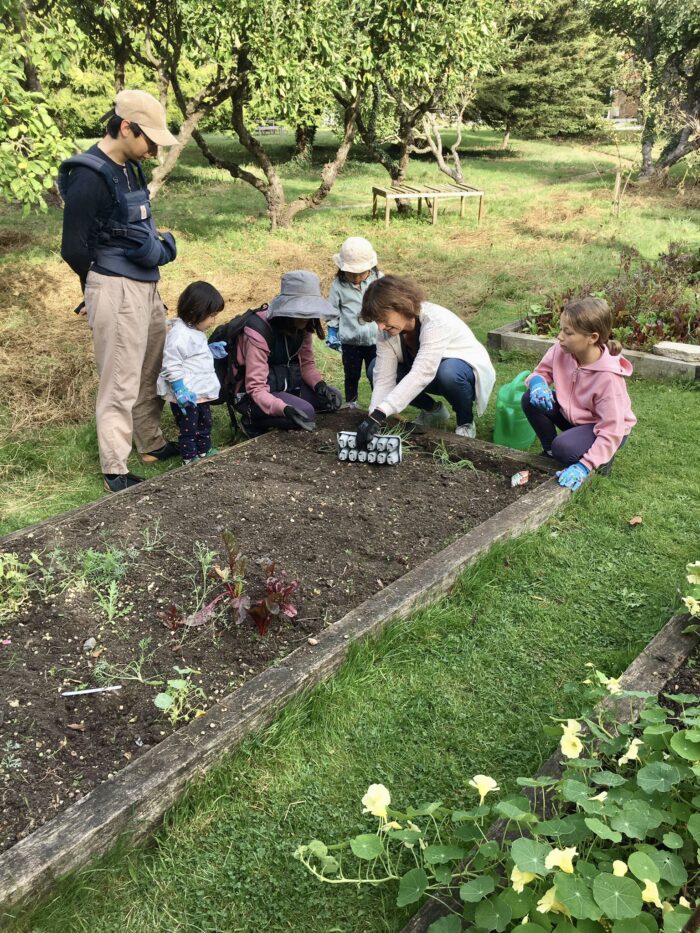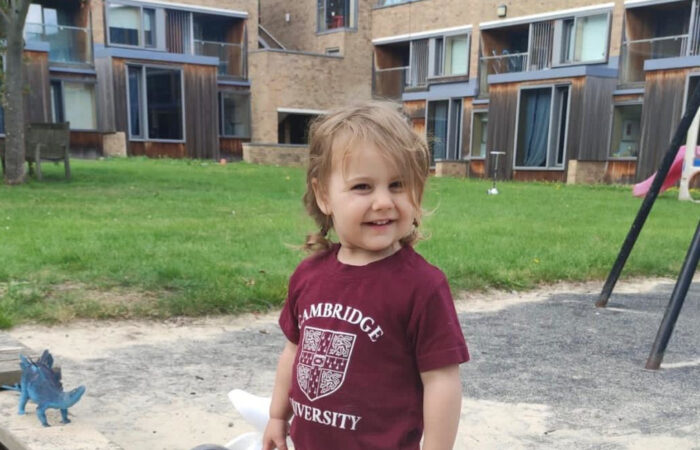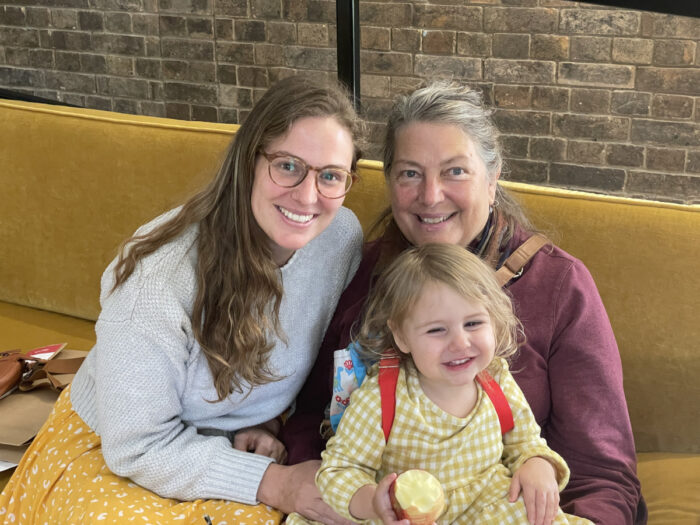For our next sustainability research focused student profile we meet PhD student Lily Rubino whose research explores the relationship between the social, economic and political impacts of water contamination and issues of environmental justice.
Lily grew up in a mountainous community in upstate New York, nestled in the Hudson River valley, and recalls spending happy childhood summers swimming in the nearby lake with her brothers; the constant hum of insect life in the background. Lily’s interest in the environment was influenced from a young age by her family. Her older brother whose encyclopedic knowledge, even as a child, of the local flora and fauna made the forest around their home come to life. Her mother – a keen gardener – showed Lily how to nurture and grow plants (sungold cherry tomatoes are her favorite summer treat), and her father, whose intellectual curiosity extended to all subjects, including the natural world.
As I grew up, I always loved engaging with the world around me, learning to care for it, and have a care for it, noticing it.
Seeking a way to accommodate her interest in the environment and how people interact with and within it, Lily created her own inter-disciplinary degree. She double majored in anthropology and environmental science at the College of William and Mary in Virginia. The social sciences grounding of anthropology helped her to understand the importance of interrogating dominant narratives and how to seek out, listen to, and value diverse perspectives and her interest in the environment focused on water and food systems and the way that people interacted with land in different communities around the world.
After her undergrad Lily spent a year working for a social entrepreneurship company in Washington, DC researching different aspects of U.S. education policy, as well as working with a university in Costa Rica dedicated to fostering stronger ties between social- entrepreneurship and sustainable agriculture in the Global South. However, Lily knew she wanted to focus on research and possibly pursue a PhD but she needed more direct research experience, so she applied to do a Masters of Science in Anthropology, Environment and Development at University College London, ‘I really liked the multi-interdisciplinary approach and the research component meant you were required to carry-out an original research project for at least three months.’
At UCL Lily started to focus intently on global water issues and public health. Aware that water had already become a point of conflict around the world, Lily felt this would only continue as climate change progressed, so she wanted to pursue research in that area. A fellow student had a friend working for the Red Cross in Colombia, in the water division, and they ended up building a research project together in Leticia, a frontier Amazonian city on the border with Brazil and Peru.
Lily’s research project focused on the indicators used to track global progress for the United Nations (UN) sustainable development goal of ‘universal access to water’. UN indicators mapped the level of access to water from low to high, with households having access to piped water being regarded as having the highest access in contrast with other households that had to walk miles to access surface water. Lily’s research looked at the story these indicators told about access in a water dense environment like the Colombian Amazon. As Lily explains, ‘the UN indicators would show a higher level of access than the reality because while you might be connected to piped water from a municipal water system, that water might only run once a week at most or the water might be highly contaminated because of storm water run-off. I created more detailed indicators to measure access to water as part of my research. Many other studies also highlighted the discrepancy between the indicators and local realities. There has since been recognition by the UN that they were not accurately measuring progress and their indicators have now been somewhat amended.’
After her Masters, Lily took a break from academia and worked for WaterAid, an international development non-profit for almost five years. At WaterAid she worked with philanthropists to raise funding for the organisation’s projects, as well as on policy and advocacy initiatives to improve access to water, sanitation, and hygiene all over the world. It was a great learning experience and she benefited from excellent mentorship – something Lily aspires to pass on to others too – but she was keen to understand the underlying causes of water insecurity and recognised the opportunity to do that through direct research.
The Gates Foundation had a connection with WaterAid, so she knew of the Gates Cambridge Scholarship, which supports research committed to improving the lives of others. Lily discovered that Professor Sarah Radcliffe’s work aligned with her interests and proposed a community-led project on water insecurity based in Colombia. Unfortunately, COVID intervened, making Lily’s initial project impossible, so she developed a project much closer to home. In 2016 it had come to light that residents in a city just 20 minutes north of Lily’s hometown had been drinking water contaminated with PFAS, a suite of synthetic toxic chemicals developed for their water-resistant and fire-retardant properties. On further investigation, Lily realised she had a network of people in the area who were interested and could support the research and she was also passionate about investigating toxic water contamination that was directly impacting her local community including some friends and family.
The area affected is incredibly diverse – the majority are people of colour – which is not the norm for our region. Why did this particular community have their water contaminated? I wanted to understand the social, emotional and physical impacts of decades of unknowingly drinking toxic chemicals on the community members and help understand what type of remediation and repair was desirable and possible but also why it occurred – exposing the conditions that facilitated contamination, asking why conditions persist, especially for communities of color in the United States.
Lily’s hope is that her PhD research will help support local advocacy around remediation and repair that goes beyond just cleaning up the water supply – if that is indeed even possible. She wants her findings, ‘to help the community activists hold people to account and make the case for a different approach to the introduction of toxic chemicals into our environment.’
Living with a family at Churchill College
Churchill has provided a safe and welcoming home for Lily, her husband and their young daughter Amaryllis. She particularly values the community of student families and family friendly accommodation in the Wolfson Flats with its community room and enclosed playground. The College has been very welcoming to her as a student with a family, providing highchairs in the dining hall and access to acres of beautiful green spaces including to woodland gardens full of wildflowers and a vegetable plot which she is using to help teach her daughter how to care for the world around her. At the beginning of 2022, Lily decided to take on the role of the MCR Families Officer at Churchill.
From my perspective as a first-time mother, having a child can be a very isolating experience, so I took on the position of the MCR Families Officer to help cultivate an even stronger sense of community support amongst student-parents at Churchill.
Lily has already organised a range of different events including an Egg Hunt, movie night and a July BBQ for the MCR and SCR families community. She has also been running a series of Fresher’s events including a Families Welcome Brunch, Garden Day, and upcoming Halloween Spooktacular followed by trick or treating around the postgraduate housing complexes.
It is wonderful to connect with people who understand the very unique challenges of being a student whilst also raising a child – especially as an international student – we need to support each other as our “villages” are often very far away.


Next steps
Looking beyond her PhD Lily is not yet clear on how best to balance her role as a mother with her career aspirations, but she hopes to forge a flexible path that will enable her to continue seeking justice for people who have experienced water contamination, whilst also bringing up her family. She also hopes any small changes that might be brought about by her work, now or in the future, will help make a positive difference to the world.
If you start to question the status quo, the way things are done, even in just a small way – that can ripple and join with others to become a force. The way that change happens is slow and incremental sometimes, especially when there’s so much power and money behind the interests of the status-quo, but if we get it to the point where something like the large-scale introduction of untested or knowingly toxic chemicals into our environment, is no longer acceptable, then we can start to make a real difference.


Title image credit (Lily with her partner & daughter in front of the Hudson): Gabrielle Gerard Photography
